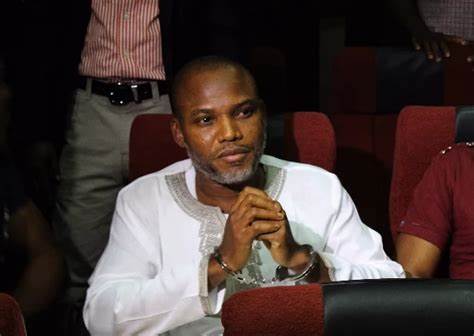Detained Indigenous People of Biafra leader Nnamdi Kanu has formally accused Department of State Services operatives of using intimidation tactics and solitary confinement to extract confessional statements following his 2015 arrest.
The separatist leader made these serious allegations during Wednesday’s proceedings at the Federal High Court in Abuja, after prosecutors presented evidence from their third witness, a DSS operative identified only as “CCC” who participated in Kanu’s interrogation between October 21 and November 4, 2015.
The prosecution witness testified that all interrogation sessions were comprehensively video-recorded, with Kanu providing written statements after each encounter. Federal government counsel Adegboyega Awomolo presented two video compact discs and three written statements allegedly authored by Kanu as key evidence in the case.
While the defense initially raised no objections to the evidence presentation, Kanu’s lead counsel Paul Erokoro later challenged the admissibility of the written statements, arguing they were obtained through coercive methods without proper legal representation.
“The defendant was systematically denied access to legal counsel, threatened with bail denial, and deprived of the daily one-hour fresh air period that medical personnel had recommended due to his deteriorating health condition,” Erokoro informed the court.
Justice James Omotosho responded by ordering a trial-within-a-trial procedure to establish whether Kanu’s statements were genuinely voluntary or obtained under duress.
During the subsidiary hearing, the DSS witness maintained that all statements were provided voluntarily. However, under intensive cross-examination, the operative acknowledged having no direct personal contact with Kanu in his detention cell, though he claimed familiarity with personnel who did interact with the defendant.
Erokoro challenged this testimony directly, stating: “I submit that if any DSS officer named Mr. Brown visited the defendant in his cell to issue threats, you would have no knowledge of such interactions.” The witness responded that such behavior would be inconsistent with DSS operational procedures.
Kanu provided his own detailed account of the alleged coercion, describing how the intimidation process began immediately upon his arrest in Lagos. He testified that he was physically restrained with chains, blindfolded, and transported by aircraft to an unknown destination without being informed of his whereabouts.
Upon arrival in Abuja, Kanu alleged he was placed in solitary confinement under harsh conditions without adequate lighting. He specifically accused a DSS officer identified as Mr. Brown, reportedly serving as Assistant Director of Investigations, of making explicit threats regarding his treatment.
According to Kanu’s testimony delivered through his legal representative, the DSS official warned that failure to comply with their demands would result in the elimination of his daily one-hour outdoor break, which had been medically recommended due to frequent nosebleeds and poor cell conditions affecting his health.
During the prosecution’s cross-examination phase, Kanu made additional serious allegations regarding the integrity of the evidence presented against him. He claimed that portions of the DSS video interviews shown in court had been deliberately edited, and that security operatives had specifically instructed him on the content to include in the written statements now being used as prosecution evidence.
Following the completion of testimony from both sides, Justice Omotosho directed the prosecution and defense teams to prepare comprehensive written arguments addressing the voluntariness of Kanu’s statements. Both legal teams have been ordered to submit their final addresses by 9 a.m. on Thursday, May 29.
This trial-within-a-trial represents a critical juncture in Kanu’s ongoing legal proceedings, as the court’s determination regarding the admissibility of his statements could significantly impact the prosecution’s case. The allegations of coercion and procedural violations raise important questions about detention practices and defendants’ rights within Nigeria’s criminal justice system.

















